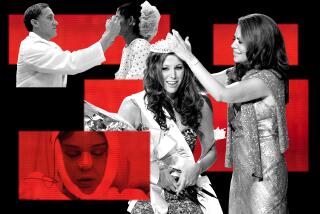‘Nip/Tuck’ is as realistic as a Barbie doll
“Nip/Tuck”
Wednesday on FX
Episode: “Lola Wlodkowski”
The premise: Lola (Danica Sheridan), a morbidly obese woman, approaches Dr. Christian Troy (Julian McMahon) for weight-reduction surgery. Before proceeding with the planned liposuction and tummy tuck, Christian becomes sexually involved with his patient. He also discovers and biopsies a melanoma on her back, which has spread to her lymph nodes and will require chemotherapy. Meanwhile, Dr. Sean McNamara (Dylan Walsh) is treating Tracy, a woman who embraces a celibate life, idolizing the doll Barbie. Sean surgically removes her nipples, promising her no scars, as part of her attempt to become asexual and look like the famous doll. She too becomes sexually involved with her doctor.
The medical questions: Can morbid obesity be improved by local procedures such as liposuction or tummy tucks? What is the prognosis for melanoma that has spread to the lymph nodes? Would a surgeon ever remove a woman’s nipples simply to make her less sexual? Are there professional repercussions for plastic surgeons who become sexually involved with their patients?
The reality: A woman as obese as Lola could not be treated by either liposuction or abdominoplasty (tummy tuck). Such procedures are too limited to remove large amounts of fat tissue, says Dr. William Y. Hoffman, chief of plastic and reconstructive surgery at UC San Francisco.
The primary treatments for morbid obesity are bariatric procedures such as gastric banding or gastric bypass, adds Dr. Sherrell Aston, professor of plastic surgery at New York University’s Langone Medical Center. “After the initial weight loss, then procedures can be performed to get rid of the massive amounts of hanging tissue.”
The prognosis for a melanoma on the back that has spread to the lymph nodes is often poor, Aston says, with approximately a 37% five-year survival rate.
As for a patient who wants her nipples removed, she should be immediately referred to a psychiatrist. “There is no described procedure for removal of nipples other than in conjunction with mastectomy [breast removal] or lumpectomy for cancer,” Hoffman says, adding that the promise and surgical creation of nipple-less breasts without scars “is ludicrous and does plastic surgeons an injustice.” Scars, no matter how small, are never invisible. Aston calls the concept a “scriptwriter’s procedure,” rather than a surgeon’s.
Finally, sexual relationships with patients are considered unethical not just by the American Society of Plastic Surgeons but also by every other doctors organization.
A practitioner accused of such highly unethical behavior would be investigated by the state board of medical quality and, depending on the circumstances, could face loss of his or her medical license. “Evidence of exploitation” is one of the factors the board would attempt to establish. That means the doctor used his or her authority and knowledge of the patient to take advantage of the patient. That is clearly evident in this episode.
Hoffman offers an especially harsh opinion of the show -- and its portrayal of his field. Even discussing the possibility of the surgeries depicted in the episode lowers real doctors to the wretched level of the show, Hoffman concludes.
Siegel is an associate professor at New York University’s School of Medicine and author of the e-book “Swine Flu: The New Pandemic.”
More to Read
The complete guide to home viewing
Get Screen Gab for everything about the TV shows and streaming movies everyone’s talking about.
You may occasionally receive promotional content from the Los Angeles Times.






